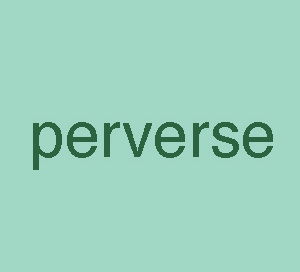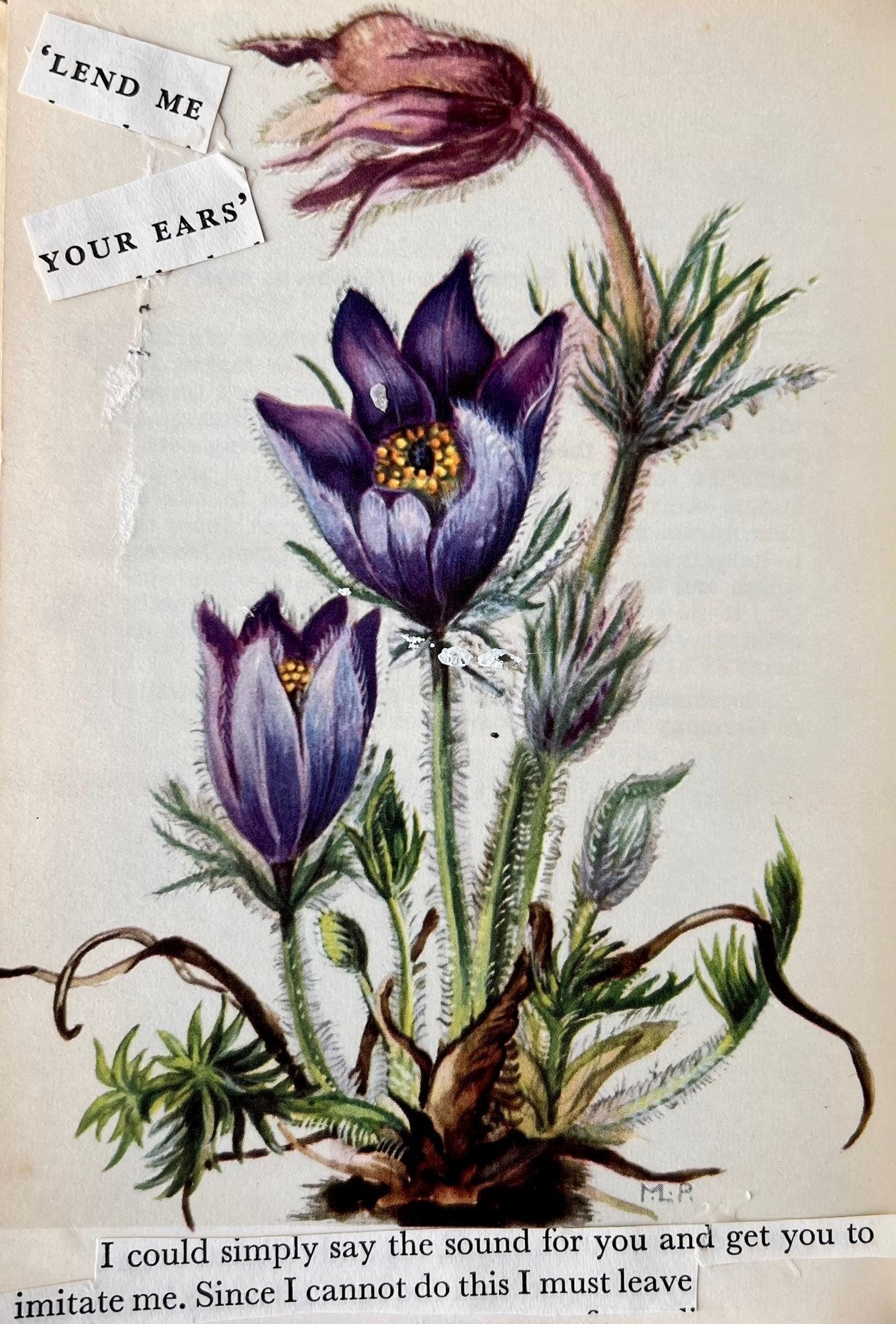Sugarman
Harker
Stephenson
Tunstall
Ormonde
Hullo there,
Welcome to another autumnal week of PERVERSE poems — please enjoy this new offering! Should some of this set come with a not-safe-for-work warning? Perhaps. It really depends where you work.
Chrissy
PERVERSE editor
PS Some poems have been included as jpegs to preserve their formatting. It is best to view them on a larger-than-phone-sized screen, or a phone turned sideways (clicking into the image itself), or else projected onto a phenomenal rainbow.
Paul Stephenson
Drag Cabaret
Our host for the evening was a talking cloud,
a French-speaking cloud called Jean-Cloud
wrapped in a white quilt, wearing a pillow
on its head and with two open-mouthed fish
for slippers. Later in the show, the cloud sang
When I was young, it seemed that life was so wonderful,
a miracle, oh, it was beautiful, magical, then cried.
Bursting in, a skinny cowboy in black stilettos
and denim cut-off shorts who kept drawing
pretend guns from his pretend holsters
and making out like he was shooting us left
and right, then rubbed his two-finger weapon
on his tits, which were large pink balloons
that burst, flooding the stage with water.
A giant white envelope shuffled sideways
onto the stage. It was an open envelope,
the large lickable V-shaped flap sticking up
like a hood for the postman it contained who
had a small red ball gag in his mouth which
he’d pop out then suck in again, delighting
the audience to a silly squeaky techno beat.
And there was a tree. With two small eyes
up in its crown, barely moving from its spot.
Till at one point it started lifting its trunk to
reveal a young woman who stepped out from
behind the bark, walked towards us, up steps
and out the theatre door. Seconds later, the tree
was up on high, there playing a harp in the sky.
Lucy Tunstall
Lend me your ears
Ryan Ormonde
from Drag Lady Sonnets
129
Th’expense of spirit / spouting pervy thought in verse confounds accountancy, a lusty audience of scribes. You take pride; lips demand their readers, libraries their silence. Is drag the sublimation of desire? Read Freud, record the movements of his member. Behold the tension of these tenses, stages staged. Sigmund is rising, tumescent, full. Sigmund is rigid, detumescent, the fall. Heaven to hell. Meanwhile, the razzle-dazzle, the ongoing show, is Paradise sustained. The object of tantric desire is fruit, serpent, Adam, Eve in one. Free love, the tree of life itself. Timber, pulp and leaves. Audience of sunlight and / sanctuary of shade.
Contributor Notes & Bios
Jeffery Sugarman
https://x.com/jcsugarman; https://www.instagram.com/jcsugarman/; https://www.facebook.com/jeffery.sugarman
Jeffery Sugarman is an American-born poet living in London, and was a 2019-20 Jerwood-Arvon Mentee with Hannah Lowe. His poems are published widely and have been long-listed twice in the National Poetry Competition. He has one pamphlet, Dear Friend(s), from The Emma Press (spring 2019).
Note on ‘Poem of Three Men, and the World’:
“How to write about intimate human relationships, particularly complex, queer relationships, in the urgent context of environmental collapse? Does this poem’s male threesome find pleasure in their closed, raunchy ‘trigonometry’ (an intellectual construct to measure physical objects) by selfishly ignoring other sentient life? Our relationships seem paradigmatic, so I’m encouraging readers to consider how the ways in which we love, erotically and emotionally, may reflect, even shape, our attitudes toward the Earth.”
Ian Harker
www.ianharker.co.uk; https://www.instagram.com/iamianharker/
Ian Harker is a poet from Leeds: founder of Strix magazine; Honorary Fellow, Leeds Trinity University; and a director of Leeds Lit Fest. In 2024 he was shortlisted for the inaugural Tempest Prize judged by Andrew McMillan and Patience Agbabi.
Note on ‘From a Cloud of Witnesses’:
“‘From a Cloud of Witnesses’ is an excerpt from a long poem writing back to the historical (or rather the hysterical) archive that documents the flourishing (and perilous) queer subculture in London in the 1700s. The long poem is itself part of a collection of poems celebrating and mourning our queer ancestors, who knew a thing or two about how to have fun.”
Paul Stephenson
Paul Stephenson’s debut collection Hard Drive was published by Carcanet in 2023. It was a finalist for the Lambda Literary Award and is currently shortlisted for the Polari Book Prize. He has three pamphlets including Selfie with Waterlilies (Paper Swans Press, 2017).
Note on ‘Drag Cabaret’:
“I went to the Balsamine theatre in Brussels to see a drag cabaret called ‘Hippocampe’. Our host was Lylybeth Merle, and the show featured 11 performers — drag queens, drag kings and other artists. It was my first drag show. We were greeted in the foyer and led through the wings and backstage, invited to take a little drink, and ushered to our seats. Full of humour, play and inventiveness, much quirkier, queerer and eclectic than expected. I went back a second evening.”
Lucy Tunstall
Lucy Tunstall Substack; https://www.instagram.com/lucy_tunstall/; https://www.lucytunstall.co.uk
Lucy Tunstall writes poetry, criticism and memoir. Her work has been published in POETRY Magazine, The Poetry Review, The Paris Review Daily, The Guardian, PN Review and elsewhere.
Note on ‘Lend me your ears’:
“‘Lend me your ears’ is one of a series of poems made from a book of alpine flowers (illustrator: Mila Lippmann-Pawlowski) and O’Connor’s Better English Pronunciation. The textbook was full of peculiar phrases presented for their phonetics rather than their content. Cast out of their natural habitat, these non-sequiturs seemed absurd and sad, and even more freighted with meaning. The phrases felt to me like unsettled creatures, or perhaps flowers.”
Ryan Ormonde
https://www.instagram.com/ryanopoet/
Ryan Ormonde has contributed poems to Spam, The Rialto, Gutter and Perverse and collaborated on a video poem with poet Karenjit Sandhu for Magma. At present Ryan is working on a second poetry film with artist Mădălina Zaharia.
Note on ‘129’ from Drag Lady Sonnets:
“This poem is a response to Shakespeare’s Sonnet 129. The first few words are the same in both. Sonnet 129 is one of Shakespeare’s sonnets dedicated to the so-called ‘Dark Lady’. In my version, she is the ‘Drag Lady’.”
See you for next week’s issue, with poems by Paula Turcotte, Sylee Gore, Richard Skinner, Barbara Barnes and SJ Fowler.
Find us on socials
X / the platform formerly known as Twitter





